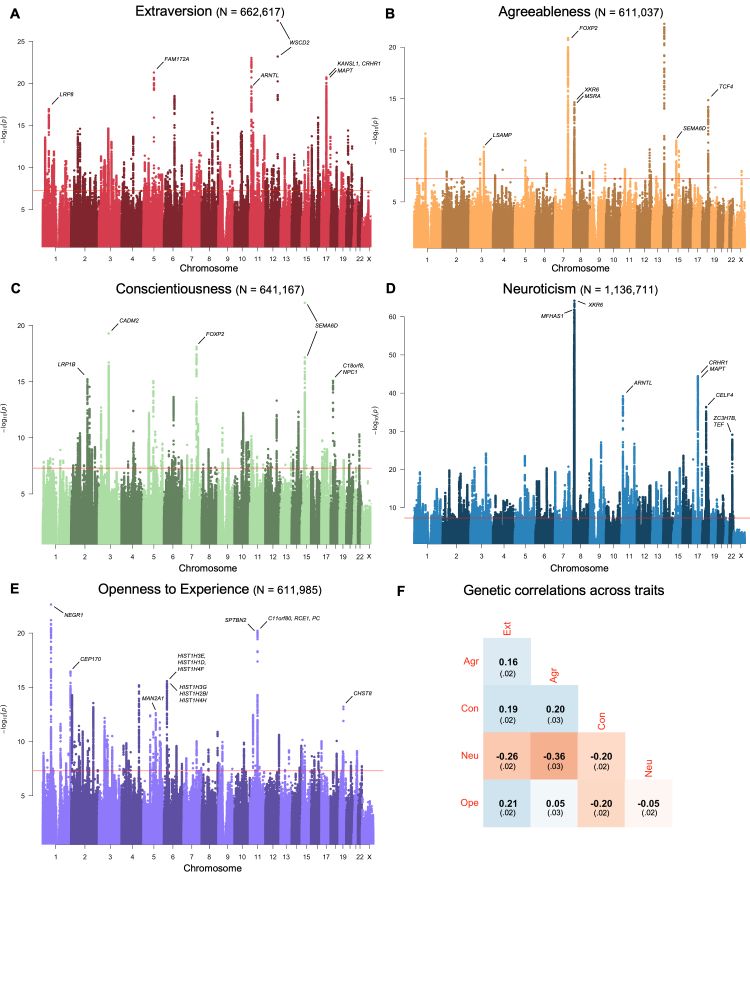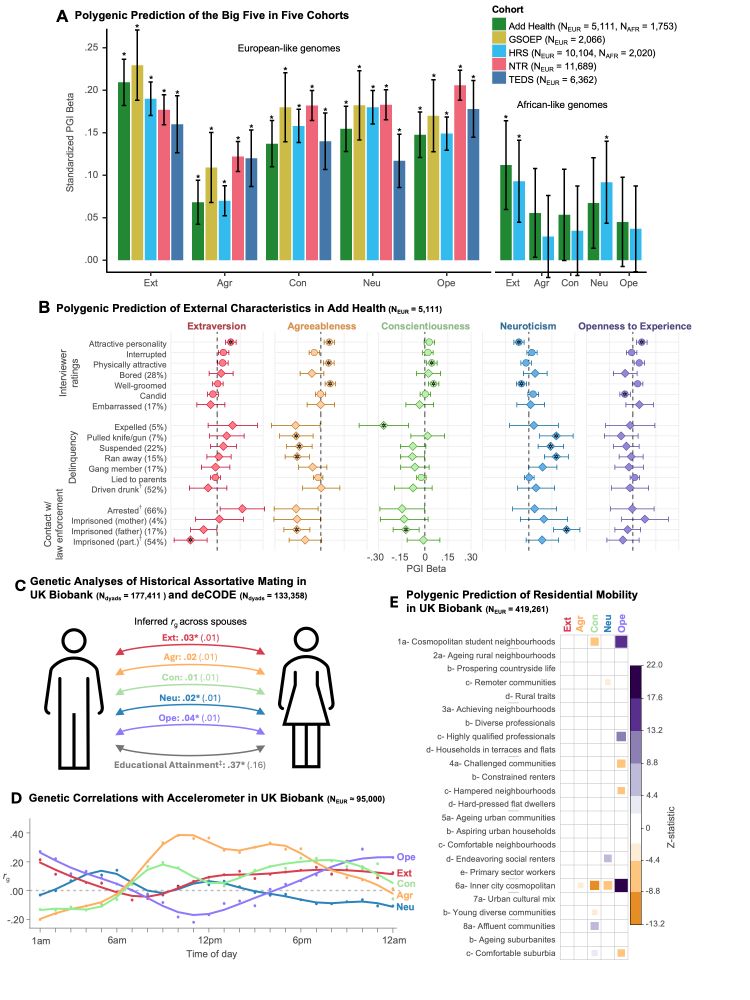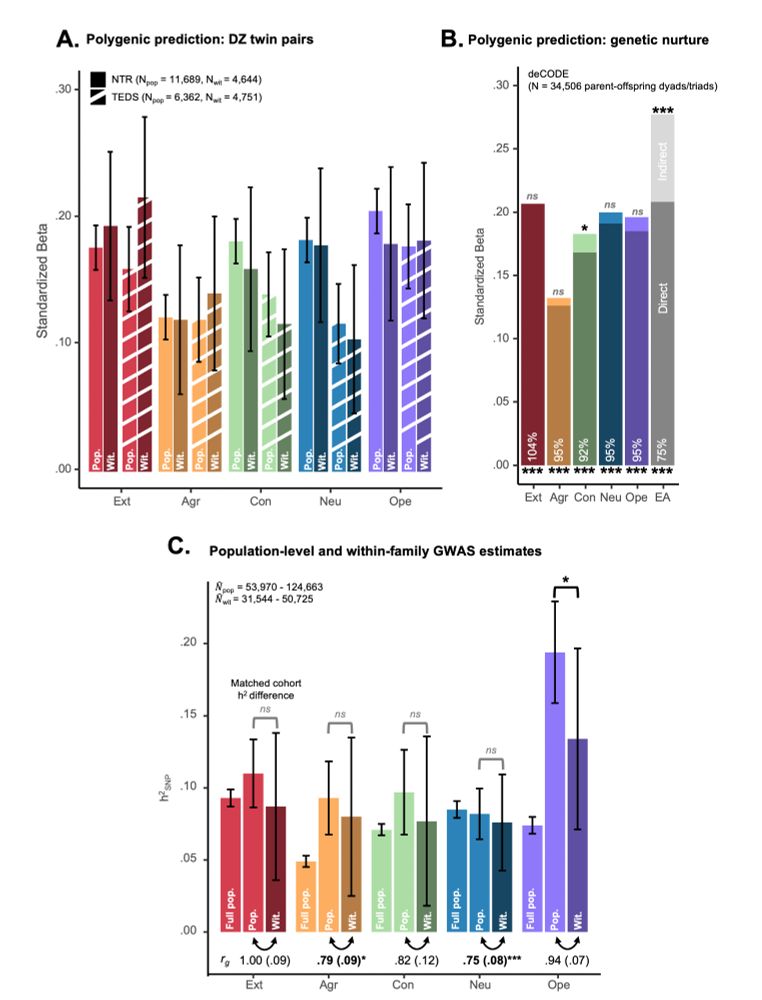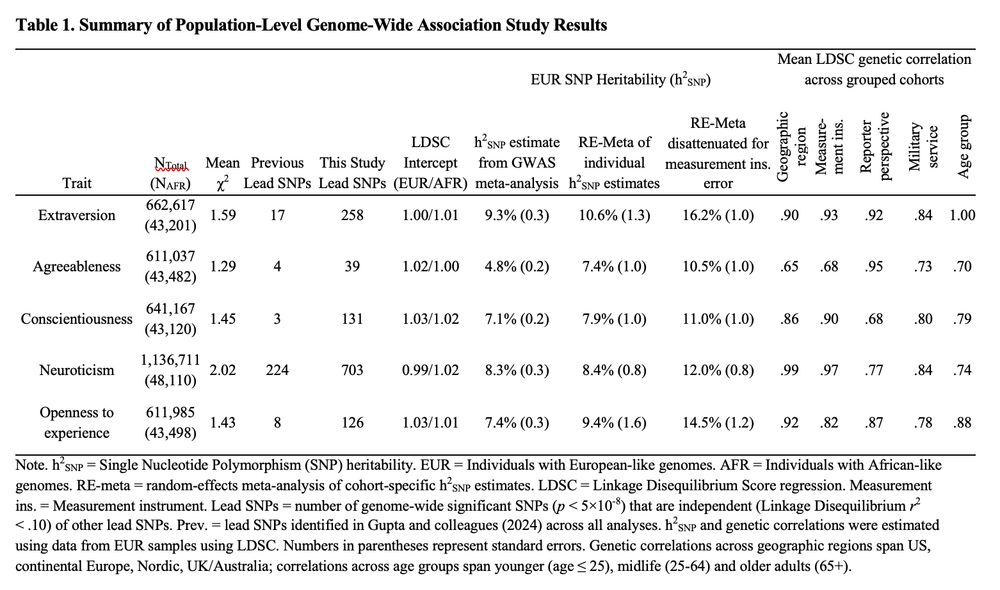Very happy to be a member of the CESifo network. I had a great time participating in the Area Conference on Economics of Education last month and presenting my work (w/ Mathias Mørk) on the estimation of teacher value-added. Working paper coming soon (hopefully)!
15.10.2025 14:11 — 👍 2 🔁 0 💬 0 📌 0

📢 Call for papers:
🚀 4th CESifo Junior Workshop on the Economics of Education 🤩
30-31 March 2026, Munich
Keynote: Michela Carlana (Harvard)
PhD students & early postdocs, please apply!
www.ifo.de/en/cesifo/ev...
Deadline: 11 Jan 2026
@caterinapavese.bsky.social @mtotarelli.bsky.social
07.10.2025 08:05 — 👍 23 🔁 28 💬 1 📌 3

Forthcoming in EJ: ‘Genetic and Socioeconomic Achievement Gaps in Elementary School’ by Mikkel Aagaard Houmark, Victor Ronda, Esben Agerbo, Preben Bo Mortensen, Michael Rosholm doi.org/10.1093/ej/ueaf033 @mikkelhoumark.bsky.social @michaelrosholm.bsky.social @resmedia.bsky.social
15.09.2025 11:03 — 👍 3 🔁 2 💬 1 📌 0

👏Congrats @anaisfabre.bsky.social on winning the 𝗖𝗘𝗦𝗶𝗳𝗼 𝗬𝗼𝘂𝗻𝗴 𝗔𝗳𝗳𝗶𝗹𝗶𝗮𝘁𝗲 𝗔𝘄𝗮𝗿𝗱 𝗶𝗻 𝗘𝗰𝗼𝗻𝗼𝗺𝗶𝗰𝘀 𝗼𝗳 𝗘𝗱𝘂𝗰𝗮𝘁𝗶𝗼𝗻 𝟮𝟬𝟮𝟱 for her paper "The Geography of Higher Education and Spatial Inequalities" and to runners-up @mikkelhoumark.bsky.social &
Genia Rachkovski for great presentations!
@ifoeducation.bsky.social
08.09.2025 08:08 — 👍 4 🔁 1 💬 0 📌 1

The following presentation still on social science genomics (yeah!! We're finally taking over entire sessions in econ conferences)
@mikkelhoumark.bsky.social estimating the technology of skill formation disentangling the differences by gender, genes, and parental SES
14.06.2025 12:18 — 👍 3 🔁 1 💬 1 📌 0
Super cool! And you didn't even mention the part that was most interesting/surprising to me: The apparent lack of shared environmental confounding. Great work.
21.05.2025 09:20 — 👍 2 🔁 0 💬 0 📌 0
Hvorimod hvis det er measurement error, der er forklaringen, så bør drengene stadig få lavere eksamenskarakterer betinget på at have samme årskarakterer.
13.05.2025 08:54 — 👍 0 🔁 0 💬 0 📌 0
Har I prøvet at køre regressionen hvor I bytter om på års- og eksamenskarakterer? Ud fra logikken i analysen så bør man vel så finde at der er en positiv effekt af fx at være dreng - for hvis en dreng og en pige har samme årskarakter (som er biased imod drenge), så må drengen vel være dygtigere?
13.05.2025 08:54 — 👍 0 🔁 0 💬 1 📌 0
Og selv hvis vi antager at eksamen er et unbiased mål for det faglige niveau og at to elevgrupper med samme faglige niveau også bør få samme årskarakter, så er det ikke nødvendigvis et problem at der stadig er forskel når I kontrollerer for eksamenskarakteren - af de to statistiske grunde jeg nævner
13.05.2025 08:54 — 👍 0 🔁 0 💬 1 📌 0
Mon ikke der også sniger sig adfærd ind i eksamenskarakteren? Din personlighed påvirker jo fx, hvor meget du forbereder dig til eksamen, og måske også selve din præstation gennem nervøsitet osv. Så det kan godt være at idealet er at karakteren kun skal afspejle det faglige, men tror vi på det?
13.05.2025 08:54 — 👍 0 🔁 0 💬 1 📌 0
🚨 REPLICATION REPORT UPDATE: One year ago, a tweet by John Holbein alerted me, @ollefolke.bsky.social, and @jopieboy.bsky.social to a paper with a shocking result about Sweden’s law criminalizing the purchase of sex.🧵
09.05.2025 09:29 — 👍 386 🔁 198 💬 7 📌 30
Endelig så kan forskellige mål jo være uperfekte på forskellig vis, og selvom de sigter efter at bedømme samme faglighed, så kan de jo være påvirket af andre forhold på forskellige måder. Så måske supplerer de bare hinanden? Eller også er det eksamenskaraktererne der er biased imod piger osv.?
09.05.2025 08:35 — 👍 1 🔁 0 💬 1 📌 0
For det andet så er eksamenskarakterer jo påvirket af om du er fx dreng eller pige, dvs. I kontrollerer for et outcome, hvilket kan forårsage alle mulige korrelationer med andre variable (collider bias). Det gør det ligeledes vanskeligt at se at grupperne "bør" få samme årskarakter.
09.05.2025 08:35 — 👍 0 🔁 0 💬 1 📌 0
For det første er en eksamen jo et uperfekt mål for dygtighed, så hvis du sammenligner fx en dreng og en pige der har fået samme eksamenskarakter, så vil det bedste bud stadig være at pigen er dygtigere (fordi der er en gennemsnitlig forskel på grupperne). Dvs. at de ikke "bør" få samme årskarakter.
09.05.2025 08:35 — 👍 0 🔁 0 💬 1 📌 0
Hej Anders. Jeg synes godt nok, det er en voldsom konklusion på baggrund af den analyse. Et par overvejelser:
09.05.2025 08:35 — 👍 0 🔁 0 💬 1 📌 0
Ja, det er rigtigt. Så man kan jo næsten tale om at sociale medier sørger for at korrigere den fejlopfattelse. Men det virker så også plausibelt at der er tale om en overkorrektion, måske drevet af, som du foreslår, at man følger populære brugere frem for bare sine venner. Interessant uanset hvad!
25.02.2025 13:12 — 👍 1 🔁 0 💬 0 📌 0

Friendship paradox - Wikipedia
Det er faktisk forventeligt at de fleste vil være "mindre populære" (eller i hvert fald have færre venner) end deres venner. Se: en.wikipedia.org/wiki/Friends.... Men ikke desto mindre virker det som en voldsom forskel, I finder!
25.02.2025 12:55 — 👍 0 🔁 0 💬 1 📌 0
Men hvis man nu antager at omkostningerne er tæt på 0, ligesom i dokumentaren, så er det jo faktisk næsten ingenting!
25.02.2025 11:33 — 👍 1 🔁 0 💬 1 📌 0
Quite striking! But I guess that correlation also includes common experiences that we do not typically think of as family background ((often) having the same teacher, same peers, in general growing up at the same time) - for regular siblings, this would largely be unshared environments, right?
10.02.2025 15:01 — 👍 2 🔁 0 💬 1 📌 0
Do genetic effects on education work through social mechanisms? And does the social environment moderate these effects? I’m addressing these RQs with brilliant @gaiaghirardi.bsky.social and @mikkelhoumark.bsky.social in a new project funded by the Independent Research Fund Denmark!
12.12.2024 11:03 — 👍 23 🔁 3 💬 1 📌 2
In my reading they present the model as equivalent (in terms of bias) to a family fixed effects model. And that model also solves the issue of cor(g_ij, e_ij). But then we agree that they are only equivalent in a world with cor(g_ij, e_j) but no cor(g_ij, e_ij)?
03.12.2024 09:31 — 👍 2 🔁 0 💬 1 📌 0
The idea is that "Because the environmental effect, e_j, does not vary within families, it is mechanically uncorrelated with the
sibling difference in phenotypes, y_1j − y_2j". But if there was an individual-specific environment, e_ij, it would be correlated with g_ij and y_1j − y_2j, i guess?
03.12.2024 09:15 — 👍 0 🔁 0 💬 1 📌 0
Interesting! But it seems that this method works only when there is no individual-specific ("nonshared") environment, which is a very strong assumption - or am I missing something?
03.12.2024 09:07 — 👍 0 🔁 0 💬 1 📌 0

ESSGN Conference IV
Bristol, May 22-23, 2025 CALL FOR PAPERS We are pleased to announce the 4th conference of the European Social Science Genetics Network. This conference aims to improve our understanding of how gene…
🔊Next conference of the European Social Science Genetics Network (ESSGN) in Bristol, 22-23 May.
✅Keynote by @michellemeyer.bsky.social
✅Panel on the current frontier of MR w/ George Davey-Smith (Bristol), Dalton Conley (Princeton), and Alice Carter (Novo-Nordisk).
essgn.org/essgn-confer...
28.11.2024 16:13 — 👍 37 🔁 27 💬 2 📌 2
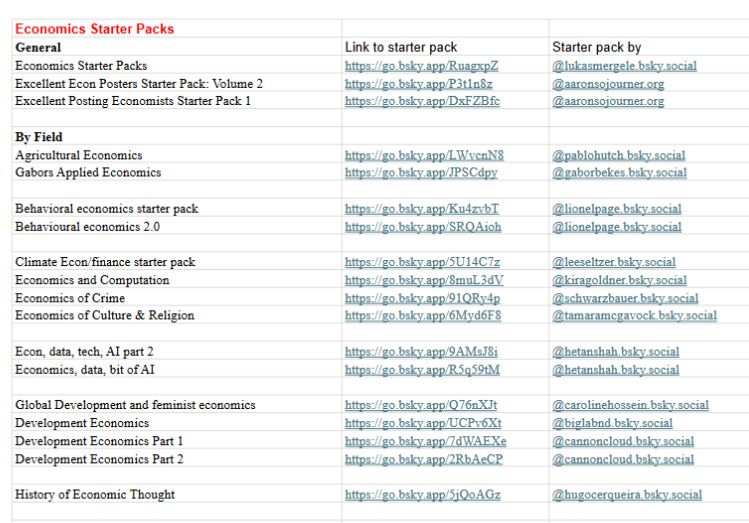
Hi #EconSky,
Not sure if the Starter Pack party's over, but I've made an Econ Starter Pack of Starter Packs! 😄
It's a work in progress, so I may have missed some. Let me know if there's anything to add—DMs are open!
Thanks for support @economista.bsky.social!
docs.google.com/spreadsheets...
21.11.2024 13:38 — 👍 354 🔁 144 💬 39 📌 29

BÆM is back! Come and join us in beautiful Bristol for the 2nd edition of the Bristol Applied Economics Meetings:
Development Economics: May 6-7
Gender, Diversity, and Human Capital: May 8-9
Submit your paper by Feb 28. Travel support is available. baem.info. 1/4
19.11.2024 12:48 — 👍 23 🔁 11 💬 2 📌 3
Great list - would love to be on it!
15.11.2024 11:28 — 👍 1 🔁 0 💬 1 📌 0
Would like to be added!
15.11.2024 11:20 — 👍 1 🔁 0 💬 0 📌 0
Hi! Here to see what the fuss is about. #EconSky
03.10.2023 09:23 — 👍 4 🔁 0 💬 0 📌 0
Postdoctoral researcher @Collegio Carlo Alberto, Turin, Italy. Interests: Development Economics, Health, Gender.
Assistant professor in economics at the University of Bonn.
Labor economics, economic history, and political economy
www.aapostenhammar.com
Economist. https://thangdang.org
Lecturer in Economics at the University of Leeds. PhD from UMass Amherst. Labour economist. Inequality, care, gender, and time use.
https://sites.google.com/view/leilagautham/research
https://business.leeds.ac.uk/faculty/staff/1580/dr-leila-gautham
PhD Candidate in Economics at University of Surrey
Applied Microeconomics and Causal Inference
economics of education PhD student in Amsterdam (NL)
passionate about data science with R and liberal arts & sciences
https://tinarozsos.github.io/
Econ PhD student @RWI Essen & U Paderborn - applied econometrics and health economics. Interested in the economics of aging.
johanneshollenbach.com
The American Economic Association is dedicated to the encouragement of economic research and to improving the professional climate in economics.
Ifo Institut & LMU, Munich
https://sites.google.com/view/caterina-pavese/home
Postdoctoral Researcher at ifo Institute & LMU || Education, Crime, Labor Economics
Personal Website: https://sites.google.com/site/maddalenatotarelli/home?authuser=0
Professor of Economics, University of Surrey. Director of Education and Skills Programme, Centre for Economic Performance, London School of Economics.
Assistant Professor in Development Economics and Child Welfare
@econ.uzh.ch. Development & behavioral economics.
PhD@Harvard, MPhil@Oxford | Website: www.ronak-jain.com
Assistant Professor LMU Munich. Labor, econometrics.
anaisfabre.com
Assistant Professor of Economics at IIES, Stockholm University. Researching the provision of education for underprivileged populations, focusing on labor market returns to human capital and the role of educational technologies.
www.laianavarrosola.com
Professor of economics | Education and labor economics | Developing and testing interventions for promoting motivation and learning in education and the workplace | Co-director of Synapse Lab
https://www.uis.no/en/synapselab
https://www.uis.no/en/node/1747
Ukrainian, Economist, Postdoctoral Researcher at KSE, organizer of Workshops for Ukraine series, #RStats
https://sites.google.com/view/dariia-mykhailyshyna/main
AP in Economics @ St Andrews | Ex-Postdoc @ ISER, Essex | PhD @ Collegio Carlo Alberto & UniTo | Interests: Education, Labour, Applied
Applied Economics PhD student at the University of Minnesota
Interdisciplinary Doctoral Fellow at UMN Life Course Center
RA at IPUMS
Labor, women+children+families, economic demography, health
Assistant Professor, Florida International University
Research Interests: Education, Development and Health Economics
Website: sites.google.com/view/wrightecon
Assistant Professor University of Vienna
PhD in Economics at KU Leuven (visit TSE)
Labor, applied micro, education




